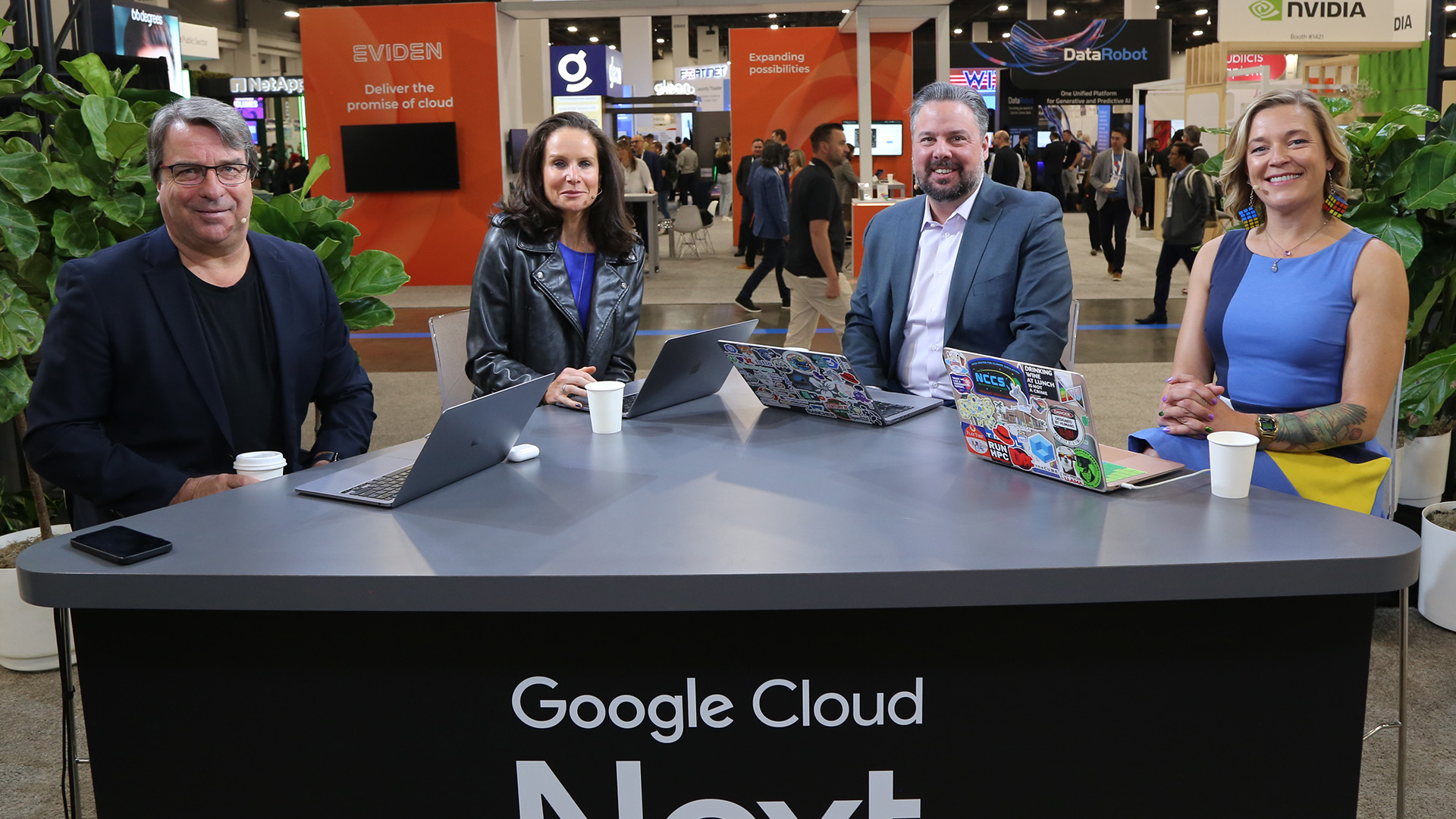 CLOUD
CLOUD
 CLOUD
CLOUD
 CLOUD
CLOUD
Google LLC might be in third place for cloud market share behind Amazon Web Services Inc. and Microsoft Corp., but artificial intelligence could allow Google Cloud to narrow that gap quickly.

TheCUBE on set at Google Cloud Next, wrapping up day 3.
This was one of the takeaways from Google Cloud Next 2024 as theCUBE, SiliconANGLE Media’s livestreaming studio, interviewed company executives, partners and industry analysts over three full days of coverage. What emerged was a picture of Google seeking to aggressively redefine cloud computing through AI innovation and a differentiated product set.
“AI’s everywhere, and I think Google’s really trying to find their footing, and you can see their posture — hello, next big thing, doing cloud in a new way,” said John Furrier (pictured, left), theCUBE Research executive analyst, during an analysis of the keynote presentations on the conference’s opening day. “They’re trying to find that cool factor, and they’re really racing fast to fill in the blanks.” (* Disclosure below.)
Here’s theCUBE’s complete keynote analysis:
Here are three key insights you might have missed during the event:

TheCUBE’s John Furrier talks with Sanjeev Mohan at Google Cloud Next.
In the process of innovating cloud services for an analytics-driven future, Google is developing tools for moving AI to data. This has become more apparent with the company’s latest announcements surrounding BigQuery and Vertex AI, Google’s unified machine learning platform.
“It’s bringing generative AI to enterprise data for the customers we work with,” said Yasmeen Ahmad, managing director of data analytics and AI at Google, during an interview at the event. “They don’t want to take their data out of their secure data cloud. They want the BigQuery/Vertex AI direct integration … that direct connection between BigQuery and Vertex AI really enables the enterprises to make use of generative AI on top of their enterprise data.”
Here’s theCUBE’s complete video interview with Yasmeen Ahmad:
Google has introduced a new feature called Function Calling to facilitate access for its AI-powered Gemini Code Assistant to real-time data. The goal is to employ AI to help users manage application lifecycles in the cloud and exploit advantages offered by container platforms.
“Kubernetes and containers have some key attributes that are a great fit for what’s happening [with AI],” said Chen Goldberg, general manager and vice president of engineering, Kubernetes and serverless at Google, during an appearance on theCUBE. “Containers are great for innovation and moving quickly. [It’s] about how do you take Gemini and create Gemini-powered insights and recommendations within the console and just help me be more productive, be more effective.”
Here’s theCUBE’s complete video interview with Chen Goldberg:
The move of AI to data is having an impact on chipmakers as well. While much of the discussion around AI has centered on the need for GPUs to run complex, data-intensive large language models, Advanced Micro Devices has seen a move toward applying AI to data stores using CPU processors.
“It’s much easier to bring AI to the data through the same CPU,” said Suresh Andani, senior director of cloud product management at AMD, during a conversation with theCUBE. “Bringing AI to the data is a motion we are seeing because the data is already in the cloud … you’re already using the same CPU-based hardware for running your foundational workloads. Just infuse AI into it.”
Here’s theCUBE’s complete video interview with Suresh Andani:
One of the key messages from the conference in Las Vegas centered on Google’s support for cross-cloud networking, opening the web data plane to enable a wide range of customizations and services for workloads. Launched in 2023, Google’s Cross-Cloud Network offers a configuration that simplifies and reduces the overhead of connecting to multiple clouds.
“Cross-Cloud Network is really about how we help you build distributed applications,” said Sachin Gupta, vice president and general manager of the Infrastructure and Solutions Group at Google Cloud, in an interview with theCUBE. “It’s how you can connect every single one of your locations into our backbone, leverage the power of our backbone, but bring your security stack of choice. We have a technology called Private Service Connect that allows you to have a proxy in front of your Google Cloud services and applications. Now we extend that to other clouds or applications or services running on-premises.”
Here’s theCUBE’s complete video interview with Sachin Gupta:
Google has funneled generative AI into Distributed Cloud, which allows customers to search sensitive enterprise data using natural language at the edge or in on-premises environments. For companies such as Elastic B.V., a provider of observability and security solutions through Elasticsearch, synergy with Google’s Distributed Cloud is facilitating the firm’s own customer support.
“What we focused on is making sure that we’re partnering with these technologies and working closely with them to make sure that Elasticsearch works effectively,” said Kathleen Walker, senior director of product marketing at Elastic, in a conversation with theCUBE during Google Cloud Next. “Google is a perfect example of that, where we got together and built some reference architectures that we could share with our mutual customers about how to build conversational experiences on Elasticsearch [and] on Google.”
Here’s theCUBE’s complete video interview with Kathleen Walker:
Google’s cross-platform focus has attracted the attention of industry analysts as well. The ability to deploy specialized models across different locations is capturing enterprise interest, according to Andy Thurai, vice president and principal analyst at Constellation Research Inc.
“When you take a larger model [and break it] into small models, one of the things that they’re doing is called a model cascading,” said Thurai, during his appearance on theCUBE. “You don’t have to have a bigger model at the edge locations to do something with that. You can have a model that’ll work well for you in that particular location. You can cascade it to another model either on cloud or the next location.”
Here’s theCUBE’s complete video interview with Andy Thurai, who was joined by
Sarbjeet Johal, technology analyst and go-to-market strategist, and Dustin Kirkland, vice president of engineering at Chainguard Inc.:
TheCUBE’s many interviews at Google Cloud Next highlighted how companies were handling security in the AI era. As AI models expand in running key business applications, some security providers are relying on Google Cloud to supply services.
“We are using a lot of the Google Cloud infrastructure, the BigQuery infrastructure,” said Munish Khetrapal, vice president of Google Cloud at Palo Alto Networks Inc., during an appearance on theCUBE during the event. “That’s the cornerstone of creating great AI. You have good data, you have good models and then you can deliver great security. That’s what we do in our SecOps platform.”
Here’s theCUBE’s complete video interview with Munish Khetrapal:
Managing permissions and security around AI to minimize exposure of highly sensitive data has become essential for many organizations. Data storage providers such as Box Inc. are working with Google Cloud to deliver the necessary framework for using AI safely and securely.
“This idea of security and permissions around AI is really critical, and this has been holding a lot of customers back from just even embracing it,” said Ben Kus, chief technology officer of Box, in an interview with research analysts from theCUBE. “Certainly, if they go to try to build stuff themselves, this has been a challenge. This is why at Box we provide that kind of capability, and then we’re able to help customers understand how to use it in a secure and safe way.”
Here’s theCUBE’s complete video interview with Ben Kus:
Protecting sensitive data gained new significance for Google this month when the company announced that its Public Sector division had been granted authority to operate at top-secret security levels within U.S. government agencies. Adoption of AI in the public sector is also leading to an increased focus on key security practices such as zero trust.
“[Government agencies] have already been working with generative AI. They want to rapidly adopt, and they’re trying to implement it as speedily as they can,” said Karen Dahut, chief executive officer of Google Public Sector at Google, during an interview on theCUBE. “Our entire architecture is predicated on zero trust. When I talk about Google Cloud having all of the commercial technologies of zero trust built in, that’s what I mean. It’s built into our company’s DNA.”
Here’s theCUBE’s complete video interview with Karen Dahut:
To watch more of theCUBE’s coverage of Google Cloud Next 2024, here’s our complete event video playlist:
(* Disclosure: TheCUBE is a paid media partner for Google Cloud Next 2024. Neither Google LLC, the primary sponsor for theCUBE’s event coverage, nor other sponsors have editorial control over content on theCUBE or SiliconANGLE.)
THANK YOU